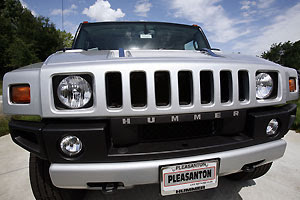NEW YORK – Hummer, the off-road vehicle that once symbolized America's love for hulking SUVs, has hit a dead end after its sale to a Chinese heavy equipment maker collapsed late Wednesday.
Sichuan Tengzhong Heavy Industrial Machines Co. pulled out of the deal to buy the company from General Motors Co. Tengzhong failed to get clearance from Chinese regulators within the proposed timeframe for the sale, the Chinese manufacturer said Wednesday.
GM said it will continue to honor existing Hummer warranties.
"We are disappointed that the deal with Tengzhong could not be completed," said John Smith, GM vice president of corporate planning and alliances. "GM will now work closely with Hummer employees, dealers and suppliers to wind down the business in an orderly and responsible manner."
GM has been trying to sell the loss-making brand for the last year and signed a deal with Tengzhong in October. However, resistance from Chinese regulators, who have been putting the brakes on investment in the fast-growing Chinese auto industry, created difficulties from the start.
As recently as Tuesday, private investors were trying to set up an offshore entity in a last-minute effort to complete the acquisition ahead of a Feb. 28 deadline. That plan, along with other options, was unsuccessful, according to a person close to the situation. The person declined to be identified in order to speak more freely.
"There's no way forward with that," this person said. "We're out of time."
GM spokesman Nick Richards said the automaker would still hear last-minute bids for the brand.
"In the early phases of the wind-down, we'll entertain offers and determine their viability, but that will have to happen in pretty short order," he said.
Hummer, which traces its origins to the Humvee military vehicle built by AM General LLC in South Bend, Ind., acquired a devoted following among SUV lovers who were drawn to the off-road ready vehicles. But they drew scorn from environmentalists and sales never recovered after gasoline prices spiked above $4 a gallon in the summer of 2008.
Sales peaked at 71,524 in 2006. But in December 2009, only 325 Hummers were sold, down 85 percent from the previous year, according to Autodata Corp.
Sticker prices start at more than $42,500 and run to about $63,000, according to data posted at the Hummer.com Web site. The H3, the most fuel-efficient vehicle in Hummer's lineup, averages about 16 mpg. The vehicles are built at GM's factory in Shreveport, La.
Under the initial agreement to sell Hummer, Tengzhong would have received an 80 percent stake, while Hong Kong investor Suolang Duoji, who indirectly owns a big stake in Tengzhong, would have gotten 20 percent. The investors would also have owned Hummer's nationwide dealer network.
Financial terms of the sale were not disclosed, although a person briefed on the deal at the time said the sale price was around $150 million. GM's bankruptcy filing last summer said that the brand could bring in $500 million or more.
Beijing had been cool to the acquisition. Tengzhong lacks a government permit to manufacture cars, and Beijing has been seeking to streamline and slow investment in the fast-growing auto industry rather than to attract newcomers.
Richards, the GM spokesman, said the collapse of the sale does not change earlier plans to close the Shreveport facility by 2012. The plant also builds the Chevy Colorado and GMC Canyon and is currently operating on a single 10-hour shift, he said. Hummer production was idled in January.
Hummer is the second brand after Saturn that GM has failed to sell as part of its restructuring. GM sold Swedish brand Saab to Dutch carmaker Spyker Cars NV earlier this year. Pontiac is being discontinued.
GM is focusing its efforts on its four remaining brands: Chevrolet, GMC, Cadillac and Buick.
World's Most Popular Topics of Discussion
Blog Archive
-
▼
2010
(54)
-
▼
February
(15)
- Top Cars of 2010
- Why Chile's Earthquake Devastation is Less than Ha...
- Features of a 4G Mobile Technology
- Why GM Shut Hummer Down?
- Bloom Box - Power Source in a Box
- Offensive Global Hacking is a Big Underground Busi...
- Credit Card Loopholes
- Pope Benedict XVI on Irish Priests' Sexual Abuse
- Top 5 Foods to Avoid Heart Disease
- Top 10 Things To Avoid on Valentines Day
- Erroneous Climate Change Report
- Why Security Threat a Top Problem in Automated Tec...
- Introducing iTablet
- ‘Immortal’ Cells in the World of Medicine
- The Pentagon's Biggest Budget Stripper
-
▼
February
(15)
About Me

- Alain James Retuya
- Alain James Retuya is an SEO specialist from the Philippines. He is an inbound internet marketing enthusiast and values visitor satisfaction on every website he managed.
Followers
iBlog Theme by Pagelines. Converted by Wordpress To Blogger for WP Blogger Themes. Sponsored by iBlogtoBlog.
0 Responses to "Why GM Shut Hummer Down?"
Leave a Reply